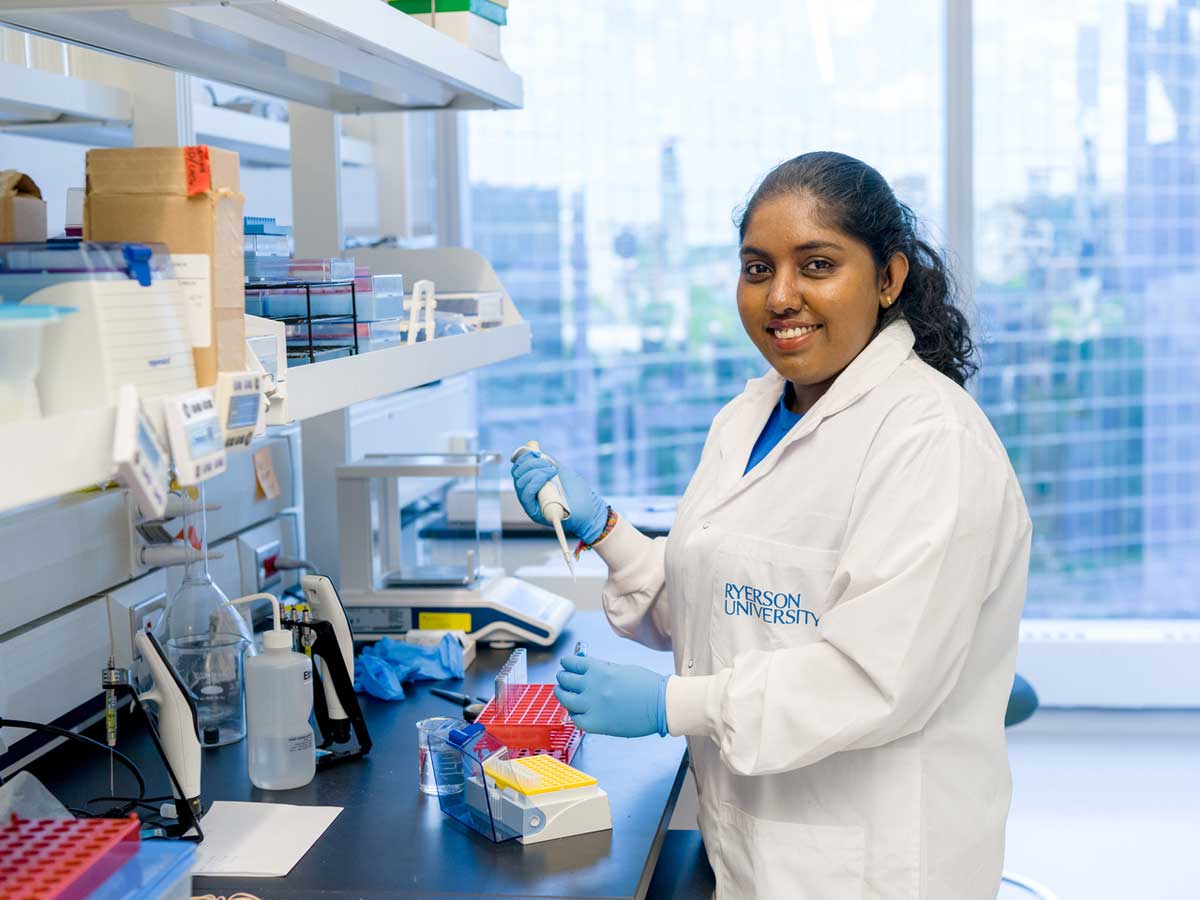Biomed grad finds the art in science

Photo: Cristina Thuppu Mudalige, graduating from Biomedical Sciences, is working this summer at the Ryerson Lab at MaRS. Photo by Clifton Li.
How do you fall in love with science? For Cristina Thuppu Mudalige (graduating this spring from Ryerson's Biomedical Sciences program), a love of science runs in the family.
"I was heavily influenced by my parents," said Mudalige, during a break from her work at the Ryerson Lab at MaRS. "I was born into that science family—my dad was a physics teacher and my mom was a dentist—and I fell in love with it. I really like the framework of thinking that’s provided by science.
"It's very rational—not to say I don't appreciate the other frameworks of thinking. But liberal arts provide a different framework of thinking that’s very essential to life as well. I like being involved with diverse experiences."
Mudalige is one of the top students from the Faculty of Science, an all-around student who succeeded both academically and in contributing to the life of the community and university.
In addition to earning a 4.13 GPA, Mudalige received three Natural Sciences and Engineering Research Council of Canada (NSERC) Undergraduate Student Research Awards (the maximum number), and worked three summers at Professor Jeffrey Fillingham's research lab. There she helped develop a lab protocol for chromatin immunoprecipitation—a method where scientists can map DNA sequences bound by a specific protein – a project that is directly related to cancer research. As part of her work, she delivered a presentation at the International Conference, Genetics 2016 in Orlando.
"She is studious, intelligent, and excellent at asking the right questions," said Fillingham, who is also program director of Biomedical Sciences. "Research is often a little open-ended, so she was able to nicely structure her summer research and get stuff done. She's very mature for her age, and a very conscientious worker."
Outside of the lab, Mudalige founded the Volunteer Leadership Award, and has volunteered with the Toronto Youth Environment Council. She was president and co-founder of the Biomedical Science Course Union 2014-16, and she cites leading a successful campaign for a student levy as one of her proudest achievements. "We communicated the value of the society—what it offers to students, their degrees, and the reputation of Ryerson Science," she said. "It was a bit of a challenge because we were going right after a year that it failed, and generally the university doesn't approve the same referendum back-to-back. We had to bring together almost everyone from science, and we got an amazing response."
She is also a visual artist, having painted murals for community arts projects in priority neighbourhoods. "I do get asked a lot where these two disciplines [arts and sciences] intersect," she said. "For example, in a DNA model I was working on, how to communicate these scientific concepts to a broader audience. What's a fun way to engage children with science? We made a comic book."
Next year, Mudalige will begin a graduate program in dentistry at the University of Toronto. This summer, she's working full-time as a research assistant at the Ryerson Lab at MaRS, under supervision of Ryerson chemistry and biology professor Michael Arts. "I'm working with a large group of samples from different organisms—plants, fish, insects. I extract the fatty acids from them, and then my supervisor gives that data to people who collect it, and it can be used to find out how they change over the years.
"I was working with examples from the ring of fire around the Atlantic Ocean so they could compare the data of the level of fatty acids there are right now to fatty acids years from now. Researchers can draw conclusions from how climate change has affected fish and plant populations."
When asked how Ryerson has influenced her work, Mudalige said, "Science, especially at Ryerson, is very evidence-based. And in terms of technical skills, everything I learned in the labs, I'm still using—even little things. Right now, I'm working with environmental biology, so a lot of concepts—ecology, community biology—are applicable in my day-to-day work."